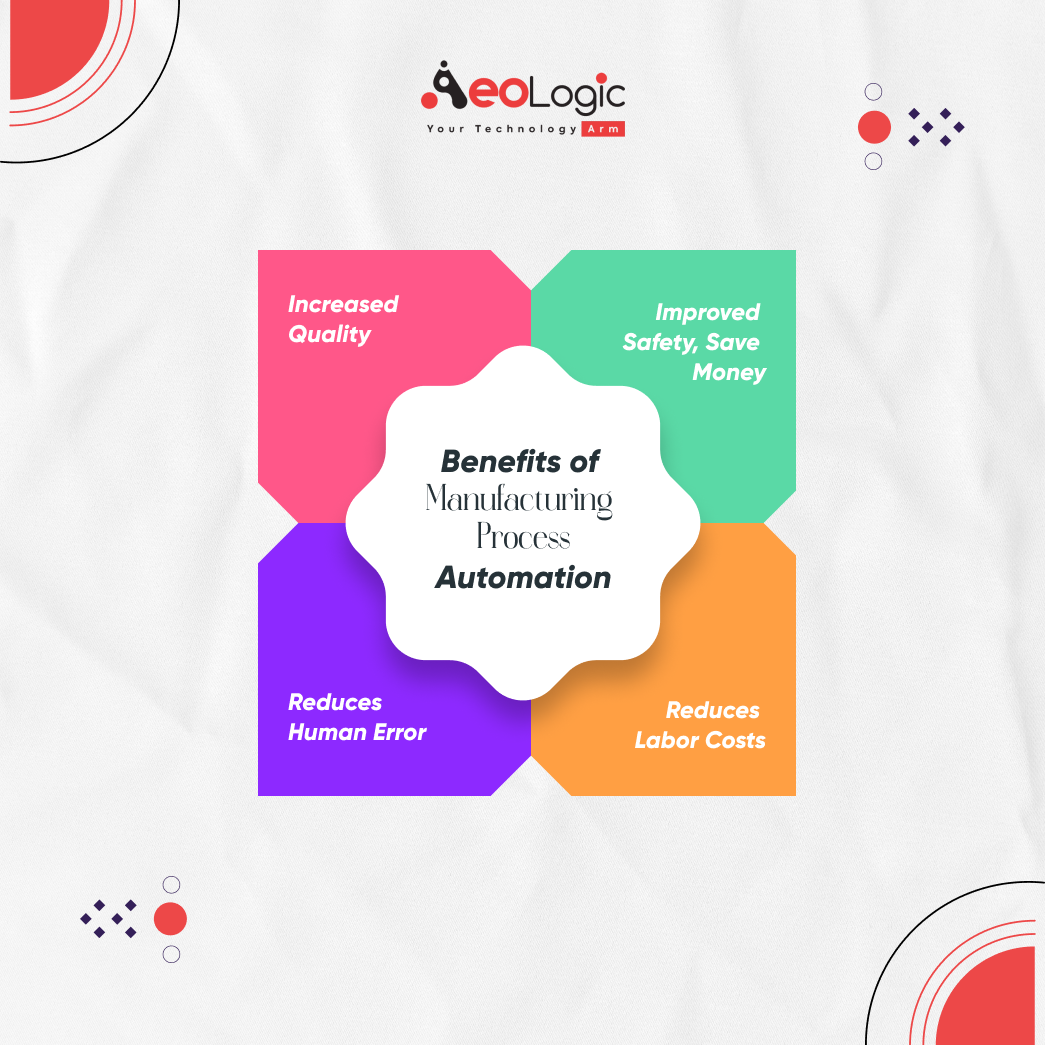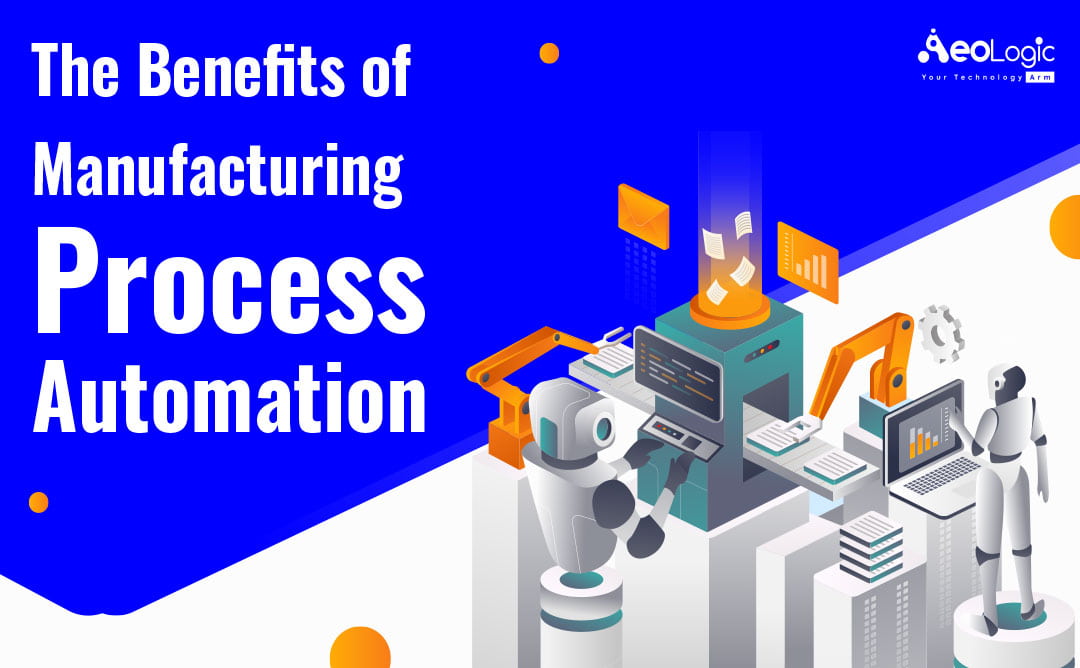Manufacturing processes have undergone significant changes over the last few decades, due to technological advances and a greater emphasis on quality control. One of the areas that have seen more transformation than others is manufacturing process automation. So in this blog, we will look at the benefits of manufacturing process automation.
So, without further ado, let’s delve straight into it!
What is Manufacturing Process Automation?

Manufacturing process automation is the use of technology to automate the production process. This can include everything from using robots to assemble products to using software to control the production line. The benefits of manufacturing process automation are many and varied. Automating the production process can help to eliminate errors and increase productivity. In addition, automating the manufacturing process can also help to improve product quality.
Products produced utilizing manufacturing process automation are more likely to match consumer expectations in terms of quality and dependability because human error is eliminated. Furthermore, automating the production process can aid in cost savings. Manufacturers can save money on production costs by removing waste and enhancing efficiency.
Also Read: Benefits of Mobile App for Your Retail Business
Benefits of Manufacturing Process Automation

There are many benefits to automating your manufacturing process. With automated machines, you can produce more products in a shorter amount of time. This can lead to increased profits and a competitive edge for your business.
Increased Quality
Quality control is the most massive benefit of the new system. Automated machines can maintain consistent quality standards, which leads to happier customers and reduced returns/warranties. Automation can also help you meet regulatory requirements more easily.
Improved Safety
Improved safety is another nice perk of automation. With fewer workers needed on the floor, there are fewer opportunities for accidents to occur. And if an accident does happen, automated machines can often stop themselves before someone gets hurt.
Reduces Human Error
We all make mistakes; nobody’s flawless. A machine that repeats tasks is less likely to make errors than an employee.
Reduces Labor Costs
Automated machines reduce the number of workers needed to complete a task. It also means that there will be fewer safety concerns, which will save money in the long run. Many costs, like as payroll, benefits, sick days, and so on, are decreased or eliminated as a result of having fewer employees.
Save Money
Last but not least, automating your manufacturing process can help you save money in the long run. Sure, there’s an upfront cost to investing in automated machines. But over time, these machines will pay for themselves with increased efficiency and productivity. So if you’re looking to save money while keeping costs low, automated manufacturing may be the right choice for you.
Also Read: How Retail Apps are Reshaping the Customer Experience?
Why should you automate your manufacturing process?
If you’re looking to improve efficiency and quality in your manufacturing process, automating is a great option to consider. Here are some key benefits of automating your process:
- Increased Efficiency: Automated machines can work faster and more accurately than humans, meaning that you can get more products made in a shorter amount of time. This can lead to increased efficiency and productivity in your manufacturing process.
- Improved Quality: Automated machines can help to improve the quality of your products by ensuring that each one is made consistently and accurately. This can help to reduce waste and defects in your manufacturing process.
- Reduced Costs: Automating your manufacturing process can help to reduce labor costs as well as the cost of raw materials. This can lead to significant savings for your business over time.
- Increased Flexibility: Automated manufacturing systems are easy to set up to make different kinds of products. This gives you the freedom to respond quickly to changes in customer demand.
- Improved Safety: Automated systems can help to improve safety in your manufacturing facility by reducing the need for workers to handle dangerous materials or operate complex machinery.
Disadvantages of Manufacturing Process Automation
While there are many benefits to automating manufacturing processes, there are also some potential disadvantages to consider. The high initial investment cost is one of the biggest disadvantages of manufacturing process automation. Automating manufacturing processes can be expensive, and it may not always be possible to recoup those costs through increased efficiency or productivity. Another potential disadvantage is that automated systems can be inflexible and difficult to change once they are in place. This can make it difficult to keep up with changing market demands or new product innovations.
Additionally, automated systems can require a high level of maintenance and upkeep, which can add to overall costs. Finally, there is always the risk that something could go wrong with an automated system, which could lead to production delays or quality issues.
Also Read: How Disruptive Technology is Impacting the Future of Retail
How to Implement Manufacturing Process Automation in an Organization
Manufacturing process automation is the wave of the future, and many organizations are already implementing this technology in order to stay competitive. If your organization is considering implementing manufacturing process automation, there are a few things you need to keep in mind in order to ensure a successful transition.
First, it is important to have a clear understanding of what manufacturing process automation is and how it can benefit your organization. There are many different types of automation technologies available, so it is important to do your research and choose the right one for your needs. Once you have a good understanding of the different technologies available, you can start to develop a plan for how to implement them in your organization.
One of the most important aspects of successful manufacturing process automation is communication. Make sure that all members of your team are on the same page about the goals of the project and the expectations for each stage of implementation. It is also important to have a clear understanding of who will be responsible for each task during the project. Good communication will help to ensure that everyone is working towards the same goal and that tasks are completed on time.
Also Read: How Robotic Process Automation Can Contribute To Retail Growth
Conclusion
Manufacturing process automation can benefit your business in many ways. It can improve efficiency and quality while reducing costs. It can also help you to be more flexible and responsive to customer demands. If you are considering automating your manufacturing processes, we recommend that you speak to a specialist company who can advise you on the best way to achieve this.
Feel free to schedule a free 60-minute consultation with one of our experts. We’ll talk about the opportunities and address any concerns you may have. Our consultants will suggest solutions and outline how they can be implemented. Let’s talk!
Aeologic Technologies is a great place to start!

I’m Deepika Pandey, an SEO strategist and content writer with 6+ years of experience. I create SEO-friendly content that drives traffic and engages readers. I combine data insights with creativity to help businesses grow their online presence effectively.






